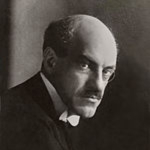Background
Montagu was born in Liverpool to Orthodox parents and remained a strict adherent to Orthodox Judaism throughout his life.

Montagu was born in Liverpool to Orthodox parents and remained a strict adherent to Orthodox Judaism throughout his life.
Although the surname was Samuel, when he began school the officials registered him under the name of Montagu and his parents decided to change his name to Samuel Montagu. In 1847 the family moved to London and Montagu found employment in a banking institution and worked his way up to become the manager of the London branch of Monteaux, a Paris bank.
He was mainly concerned with financial matters, and was responsible for such legislation as the Weights and Measures Act (1897), which legalized the use of the metric system. He also succeeded in introducing a clause in the Finance Act of 1894 exempting from death duties bequests to public libraries, museums, and art galleries. In 1888 he became a member of the House of Commons select committee on alien immigration of persecuted Jews. He retired from Parliament in 1900.
Montagu was active in the Jewish community. In 1870 he was instrumental in founding the Jewish Workingmen's Club in Aldgate, and was the first warden of the New West End Synagogue in Bays-water. In 1887 he founded the Federation of Synagogues, and established and became president of the East London Apprenticeship Fund. He worked unremittingly on behalf of the poor of East London and was treasurer of the Jews’ Temporary Shelter.
In 1875 Montagu visted Eretz Israel and helped to found a vocational school in Jerusalem. He visited Europe in 1882 to examine the situation ol the Jews fleeing from Russia, and in 1886 his visit to Moscow was cut short when the government ordered “the Jew Montagu” to leave the country.
Montagu was a discriminating collector of works of art and old English silver. His collection included several notable specimens of the great importance in the history of the English goldsmith’s art.
In 1853, together with his brother Edwin, Montagu established the bullion-brokerage firm of Samuel Montagu and Company. The firm entered the field of foreign exchange at the time when other banking houses were withdrawing. Montagu’s house soon secured a large proportion of the exchange business, making London the chief clearing house of the international money market.
His eldest son, Louis Samuel.Montagu (1869— 1927), succeeded him to the peerage as Second Baron Swaythling. He was president of the Federation of Synagogues and like his father was anti-Zionist, declaring that Judaism was only a religion.

